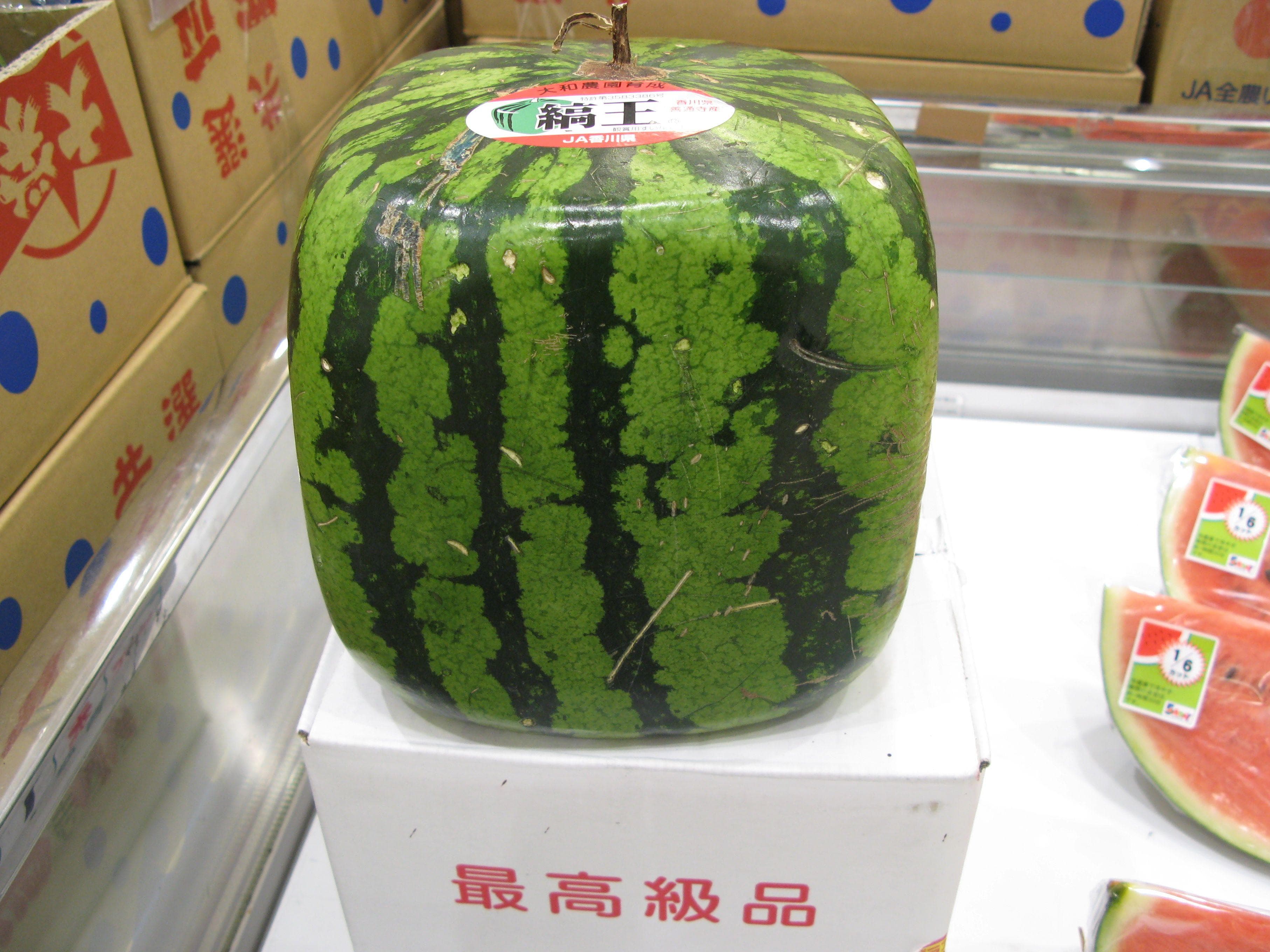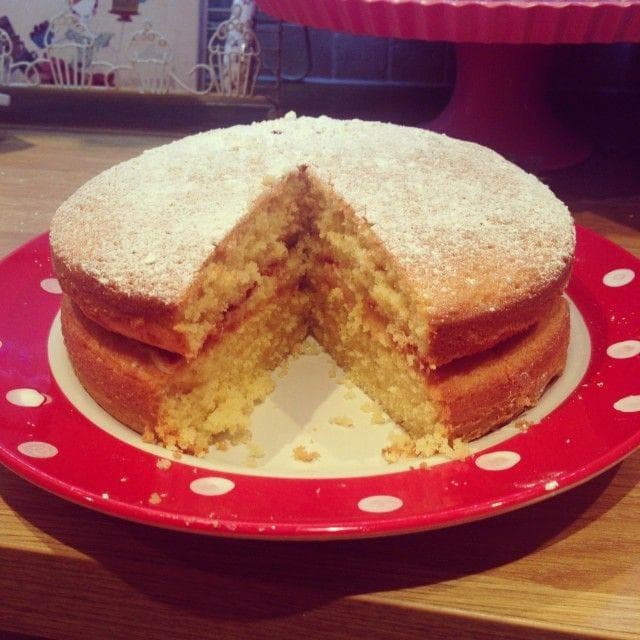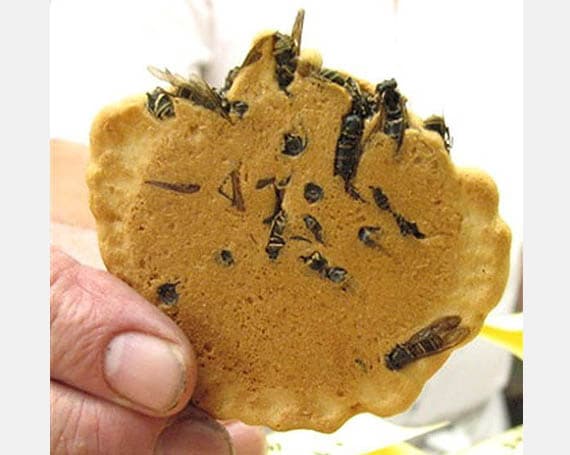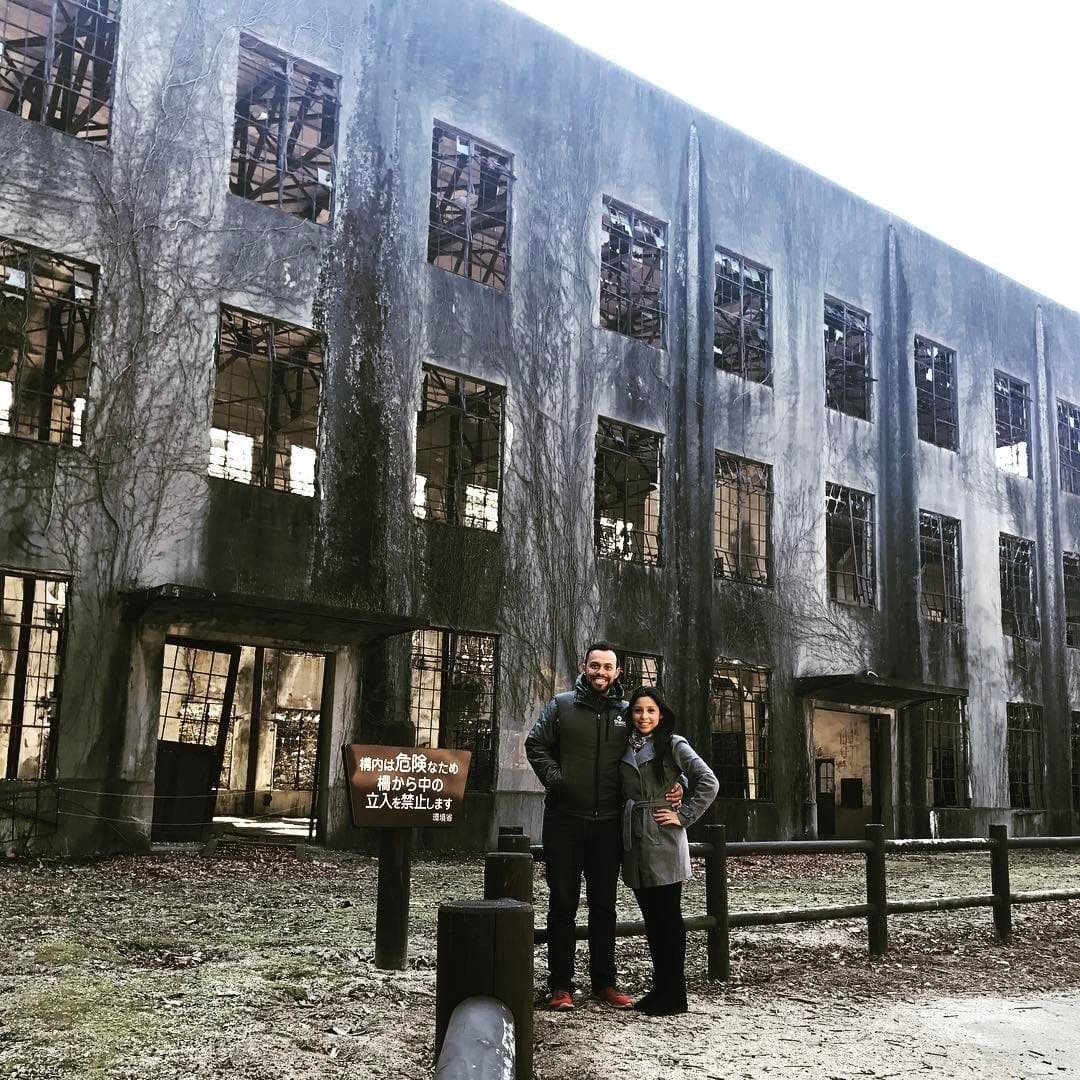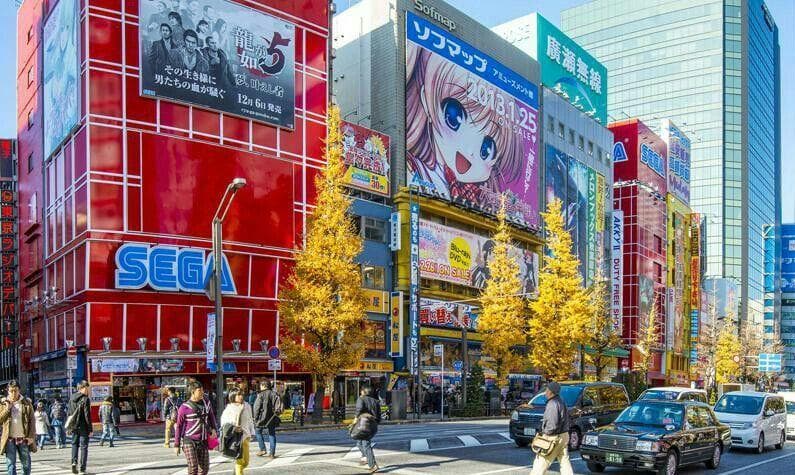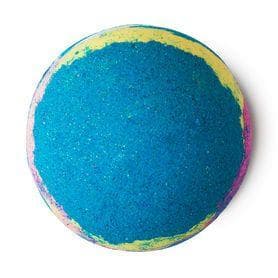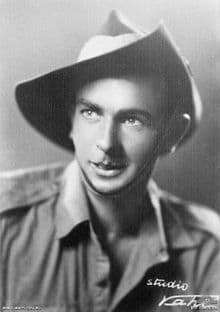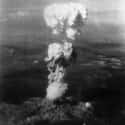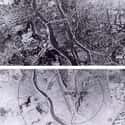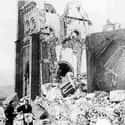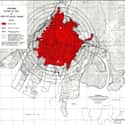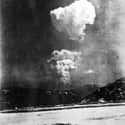(#1) The Crew Of The Enola Gay Dropped the Bomb And Was Stunned By The Result
When the crew of the Enola Gay dropped the atomic bomb on Hiroshima, no one on board - especially pilot Paul Tibbetts - had any real idea as to the type of weapon they were utilizing. While they had been briefed and shown slides of the test detonation at Alamogordo, NM, it was impossible to convey the size and complexity of the blast that would ensue. At 8:15 a.m. on Monday morning, the plane reached its primary destination and dropped the Little Boy model bomb on the Japanese city.
Because Bob Caron was manning the tail gun of the plane, he would have the best view of the detonation of the bomb and the ensuing blast. He described the experience in a 1985 interview:
I took the welder’s goggles off as soon as the flash was over. It was very shortly after that, I can’t remember the time, when I saw this shockwave. But I didn’t know it was a shockwave. It was just a ring coming out along the ground. It looked like it was on the ground, but actually it was spherical, coming up at us too. It was like dropping a pebble in a still pond. I didn’t say anything. I didn’t know what it was, when it hit the airplane. It hit it pretty hard, because I understand Tibbets yelled, 'Flack!' He thought we got hit by flack. Bounced around in the tail like that, it didn’t bother me that much. But another one came, the ricochet off the ground, and then I called out, 'Here comes another one!' And that hit the airplane.
I still hadn’t seen anything yet, outside of the shock waves. Tibbets called on the intercom again, 'Do you see anything yet?'
I said, 'Nothing yet, Colonel.' Just about that time, the mushroom started coming in view from behind the turret, just the mushroom, the famous mushroom cloud bubbling up, coming up behind the turret. I had been given a K-20, a large camera to take pictures, and I was told to take pictures and then describe what I saw on the intercom. I was kind of busy doing that, and didn’t think too much about it.
It was an awesome sight. I described the mushroom cloud as it grows. Well, it was white on the outside and it was sort of a purplish black towards the interior, and it had a fiery red core, and it just kept boiling up. I think that’s how I described it on the intercom.
Soon, the entire crew could see the mushroom cloud as it grew towards the sky and the immediate fires raging around the core of the blast. In a journal, co-pilot Robert Lewis wrote, "My God, what have we done?"
(#3) Akiko Takakura Describes What Happened To Those Near Ground Zero
Akiko Takakura was less than a thousand feet from the blast inside the Bank of Hiroshima. She described what she saw for the Japanese public broadcasting network, NHK:
I lost consciousness right after or almost at the same time I saw the flash. When I regained consciousness, I found myself in the dark. I heard my friend, Ms. Asami, crying for her mother. Soon after, I found out that we actually had been attacked. Afraid of being caught by a fire, I told Ms. Asami to run out of the building. We first thought to escape to the parade grounds, but we couldn't because there was a huge sheet of fire in front of us. Since Hiroshima was completely enveloped in flames, we felt terribly hot and could not breathe well at all.
After a while, a whirlpool of fire approached us from the south. It was like a big tornado of fire spreading over the full width of the street. Whenever the fire touched, wherever the fire touched, it burned. It burned my ear and leg. So, everyone just tried so hard to keep away from the fire. It was just like a living hell. After a while, it began to rain. The fire and the smoke made us so thirsty and there was nothing to drink, no water, and the smoke even disturbed our eyes. As it began to rain, people opened their mouths and turned their faces towards the sky and try to drink the rain, but it wasn't easy to catch the rain drops in our mouths. It was a black rain with big drops.
Many people on the street were killed almost instantly. The fingertips of those dead bodies caught fire and the fire gradually spread over their entire bodies from their fingers. A light gray liquid dripped down their hands, scorching their fingers. I, I was so shocked to know that fingers and bodies could be burned and deformed like that. I just couldn't believe it.
(#5) Eiko Taoka And The Death Of Her Young Son
Eiko Taoka, 21, was in a streetcar when the bomb hit Hiroshima and she was tossed outside onto the street, still able to hold on to her son:
I held [my son] firmly and looked down on him. He had been standing by the window and I think fragments of glass had pierced his head. His face was a mess because of the blood flowing from his head. But he looked at my face and smiled. His smile has remained glued in my memory. He did not comprehend what had happened. And so he looked at me and smiled at my face which was all bloody. I had plenty of milk which he drank all throughout that day. I think my child sucked the poison right out of my body. And soon after that he died. Yes, I think that he died for me.
Taoka's son died of radiation sickness on August 28. Out of an estimated 100 passengers, only 10 occupants of the streetcar, including Taoka, were known to have survived.
(#10) Yasuhiko Taketa, Got The Day Off From School, Which Saved His Life
Yasuhiko Taketa was a 9-year-old student whose class was given the task of demolishing parts of the city for an evacuation route. The 183 students working on the project were all killed by the atomic bomb blast.
Taketa was asked by his mother to deliver some food to his sister, so he happened to be running late to his post. He was waiting at a local train station when the bomb hit:
All of a sudden, there was a dazzling flash of light, brighter even than the sun. For a while, I was blinded. The station building and the tracks looked bluish-white, as though magnesium were being burned in front of the station.
Seconds later, I heard an earsplitting roar, the sound of a massive explosion. My ears were ringing. The ground trembled under my feet, and all the buildings in the area were shaking. Window panes were blown out and shattered. I was knocked hard onto my back, and thought that my bowels were going to burst out of my abdomen.
I was paralyzed with fear and shock, so much so that I had trouble breathing. I tried to escape, but realized that was impossible. I took shelter under a nearby bench. I was terrified by the booming sounds I heard, thinking that enemy planes were strafing the city.
Then the noise stopped. Cautiously, I crawled out of my hiding place and looked around. I saw an enormous, bright red pillar of fire (I was told later that it measured 200 meters in diameter and rose 10,000 meters in the air,) which increased in size minute by minute, reaching high in the sky.
From the ground up, the pillar of fire rose toward the sky, with tremendous force. Sometimes it was hollow at the center. At other times, broiling, leaping flames blew out of the center. The sight was so horrifying that I can find no words to describe it. An army officer standing on the platform, surveying the area with binoculars, told me that the ammunition dump at the armory had been hit.
Within minutes, one atomic bomb had transformed the entire city of Hiroshima, now under that huge fireball, into a sea of flames. I never imagined that a weapon could create a gruesome, miserable living hell. (The atomic bomb was dropped from a height of 9,000 meters above the hypocenter, ground zero. The explosion occurred at a height of approximately 600 meters. Surface temperature was 6,000 Centigrade. )
Soon the elementary school in our town became a temporary first-aid station, its classrooms transformed into hospital wards. The bombing victims were lined up there, waiting for help.
The victims' hair was frizzled, and their faces bloated and dark red from burns. Pieces of their skin were hanging down from open wounds, and their clothing was scorched. They were covered with blood. Many of them were brought in on shutters that served as stretchers. They looked like ghosts, lying there, their internal organs bulging through their hands. Some people were simply moaning. Others were calling out the names of family members, and still others begged, 'Water, please. Give me water,' as they were carried out on stretchers or in wheelbarrows. It was an indescribably hideous scene.
(#11) Keiko Ogura Became An Activist As A Result Of Her Experience
Keiko Ogura was 8 years old when her father told her to stay home from school based on a premonition he had. She was standing in her yard when the bomb hit:
Suddenly, I was engulfed in a dazzling flash of light, and the tremendous blast that followed slammed me to the ground. The straw roofs of the neighboring houses burst into flames. When I went back to the house, I found that everything inside was destroyed, the ceiling and roof tiles had been blown away, and the doors and window panes were shattered into hundreds of pieces and sticking out of the walls and pillars. But thankfully my family inside the house only suffered minor injuries.
Rain started to fall immediately after that. I went outside, and my clothes were dampened by the sticky black (radioactive) rain. My brother finally came home, with burns on his face and hands. He said: 'Hiroshima is a sea of fire.' I went outside to look at the city from the hill.
It was then that I came across a line of people, their clothes in tatters, with burns, seriously injured, fleeing the city. These people had charred hair, faces and lips swollen and blackened with soot, and they were covered in blood. Most of the people in this silent procession of ghost-like figures were soldiers or students; some of them ended up bent over and others lay down on the stone steps along the road. The whole area was filled with seriously injured people on the brink of death.
As I was walking someone on the ground suddenly grabbed my ankle. From around my feet, a weak voice said 'Give me water.' A woman covered in soot and blood was clinging to me desperately. I ran home, got some water from our well, and carried it to the dying people. Immediately after drinking the water, a number of those people suddenly slumped, and died right before my eyes. Shocked and trembling with fear, I regretted giving them water. I was so young, I did not know that it was said at the time that we were not supposed to give water to people with serious burns. I vowed never to tell anyone about what happened that day. My memory of that day remained with me as a nightmare even decades later.
Keiko Ogura has spent most of her life as an advocate of nuclear disarmament and still lectures on her experiences in Hiroshima following the August 6 attack.
(#6) Dr. Michihiko Hachiya Had No Idea Why He Was Naked
Like all survivors of the atomic bomb, Dr. Michihiko Hachiya remembered a flash of light, darkness in a matter of seconds, and barely being able to escape into the garden of his house. Profoundly weakened, he paused to regroup and suddenly realized his undershirt and underwear were gone. He was completely naked, with no idea what had caused the situation.
All over the right side of my body, I was cut and bleeding. A large splinter was protruding from a mangled wound in my thigh, and something warm trickled into my mouth. My cheek was torn, I discovered as I felt it gingerly, with the lower lip laid wide open. Embedded in my neck was a sizable fragment of glass which I matter-of-factly dislodged, and with the detachment of one stunned and shocked I studied it and my blood-stained hand.
He started yelling for his wife, who finally emerged from the wreckage of their home also stunned, her clothes bloody and torn. They both decided to try and make their way to a hospital as quickly as possible, Hachiya still naked. Exhausted after only a few blocks, the doctor told his wife to leave him and go ahead, he couldn't make it any further. She was as badly hurt as he was and he told her they had no choice, she should get to the hospital and send someone to help him.
Yaeko-san looked into my face for a moment, and then, without saying a word, turned away and began running towards the hospital. Once, she looked back and waved and in a moment she was swallowed up in the gloom. It was quite dark now, and with my wife gone, a feeling of dreadful loneliness overcame me.
Hachiya's wound began bleeding again and he lost consciousness on the side of the road. When he awoke, he decided to make one more agonizing attempt to reach the hospital. Slowly and painfully, passing people in unimaginable conditions, he finally made it to the hospital's front door. He and his wife survived, and he eventually published a diary of his experiences during and after the atomic bomb was dropped on Hiroshima.
New Random Displays Display All By Ranking
About This Tool
In August 1945, the United States dropped two atomic bombs on Japan one after another, which was the only two nuclear strikes in the world so far. There has always been a great controversy as to why the United States dropped an atomic bomb on Japan. Such a terrible atomic bomb explosion caused great panic and trauma to ordinary Japanese people.
More than 20 million civilians were killed or disabled in high temperatures and strong light caused by atomic bombs, and they were still suffering from the threat of diseases caused by nuclear radiation for decades. The random tool shares 12 stories of life after the US dropped atomic bombs on Japan.
Our data comes from Ranker, If you want to participate in the ranking of items displayed on this page, please click here.

